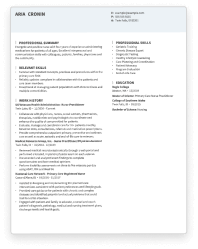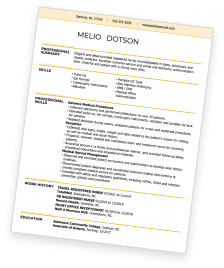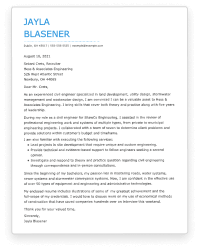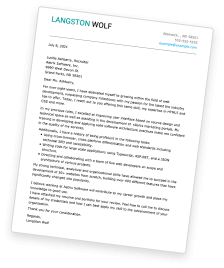SQL Developer Resumes: Overview
As an SQL Developer, your responsibilities revolve around managing databases, writing SQL queries, and optimizing database performance. You develop high-quality database solutions, review and interpret ongoing business report requirements, and build appropriate and useful reporting tools.
SQL developers are needed in almost every industry, so you might find yourself working in various environments, such as:
- Tech Startups
- Financial Institutions
- Healthcare Organizations
- Government Agencies
- E-commerce Companies
To excel as an SQL Developer, you need a strong foundation in SQL programming, database management, problem-solving, attention to detail, teamwork, and communication skills.
Ready to build a winning resume? Explore our collection of customizable templates and amazing resume examples to kickstart your job search journey.
SQL Developer Resume: Choose a Format
The first step in writing a resume for an SQL developer is to choose a format. Selecting the right resume format is essential to effectively showcasing your skills and experience. There are three formats to consider: chronological, functional, or combination.
Each format has its benefits and drawbacks, so let’s take a closer look to help you decide!
Chronological Resumes for SQL Developer
Chronological resumes present your work history in reverse chronological order, emphasizing your relevant job experience.
It is the most commonly used format, so you can rest assured employers will be familiar with it, and it is highly compatible with applicant tracking systems (ATS). This format is ideal for experienced SQL Developers with a solid track record of accomplishments.
To write a chronological resume, you simply list your previous jobs, starting with the most recent and working backward. Then, under each job entry, write bulleted sentences to describe your responsibilities and accomplishments in each role.
A chronological resume is great for showcasing your career growth and accomplishments. However, it can also draw attention to employment gaps or a lack of relevant experience.
Functional Resumes for SQL Developer
Functional resumes take a quite different approach. Instead of providing a detailed work history, a functional format prioritizes your skills and qualifications, making them suitable for recent graduates, career changers or those with employment gaps.
For example, someone new to SQL development might choose a functional format to prominently showcase their SQL expertise, database management skills, and problem-solving abilities without tying those skills to a specific timeline or previous job titles.
A functional format works well for showcasing transferable skills, but we should note that employers place a high value on detailed work history. Therefore, functional formats are less compatible with ATS and may raise questions about your job experience.
That doesn’t mean a functional resume can’t work for you, especially if you don’t have relevant work experience. However, it is good to be aware of the potential drawbacks of this format.
Combination Resumes for SQL Developer
The third option is a combination resume. A combination format blends elements of chronological and functional resumes, allowing you to showcase skills and provide a thorough work history.
This format is perfect for mid-career SQL Developers looking to highlight their experience and skills equally. It offers flexibility to emphasize relevant achievements while demonstrating some career progression.
However, this format can make your resume longer than other formats. A resume for an SQL developer should be 1-2 pages maximum, so keep that in mind when using a combination format.
Choosing a Format
Choosing the best format to showcase your unique skills and experience is a critical first step in writing your resume.
If you have trouble deciding which format to use, experts say a chronological format is always a good choice.
A chronological format may be intimidating if you lack job experience or have a significant gap in employment.
However, you can tailor your resume content to showcase your transferable skills and draw attention to your skills, education, and certifications to compensate for a less-than-perfect work history.
For example, suppose you are applying for your first job as an SQL developer. In that case, you can showcase relevant experience from other jobs, volunteer work or school coursework.
If you had an internship where you learned programming languages, you can include that in your work history. Or, if you have earned degrees in computer science or certifications in SQL, you can showcase that in your educational background.
How to Write an SQL Developer Resume
Once you have chosen a template and format for your resume, it’s time to write your resume content.
Crafting a compelling SQL Developer resume requires attention to detail and a focus on effectively showcasing your technical skills and experience.
There are five essential sections to include in your SQL developer resume.
- Contact Information
- Summary or Objective Statement
- Work History
- Skills
- Education
Keep reading this helpful guide to learn how to write each section of your resume so that it will stand out to potential employers!
Contact Information
First, place your contact information at the top of your resume so potential employers can find it easily. Your contact information should include your first and last name, city and state where you live, email address, phone number and LinkedIn profile URL.
Always ensure your contact information is up-to-date and professional. The exact format can vary depending on your resume template, but the contact information section for an SQL developer resume should look something like this:
Gary Smith
Austin, TX
Gsmith@fake.email.com
555-555-5555
linkedin.com/in/fake-garysmith/
Summary or Objective
Next, you will include a brief profile underneath your contact information to introduce your resume and entice hiring managers to read more. You have two choices for writing this section: a professional summary or an objective statement.
A professional summary will highlight your key accomplishments and skills and works best for an experienced SQL developer’s resume.
An effective professional summary for an SQL developer resume may look like this:
“Results-driven SQL Developer with over 5 years of experience in database management and optimization. Proven track record of designing and implementing complex database solutions to improve efficiency and performance.”
An objective statement is better suited to someone new to SQL development. It details your interest and passion for the work and provides an overview of your career goals and aspirations.
An excellent example of an objective statement for an SQL developer resume would be:
“Driven and goal-oriented developer successful at designing and implementing database solutions. Seeking a challenging SQL Developer role in a dynamic organization where I can leverage my expertise in SQL programming, database management, and data analysis to drive business success.”
Whether you choose a summary or an objective, it should be a concise statement that is no more than 2-3 sentences long.
Also, remember to tailor this section of your resume to each job you apply for. Use keywords and phrases from the job description to help your resume pass initial screenings by ATS and HR managers.
Work History
Next, you will craft a detailed work history section to demonstrate your career progression, on-the-job experience and accomplishments in previous jobs.
Start by listing your previous jobs chronologically, starting with the most recent and then working backward. Each job entry should include:
- Job Title
- Employer’s Name
- Employer’s City and State
- Dates of Employment
Then, write at least three bulleted sentences under each job entry detailing your most relevant job responsibilities and achievements.
Think about your work in each previous position and how it may have prepared you for the job you want. Focus on transferable skills and experience that will help you succeed as an SQL Developer.
To make this section more compelling to the reader, use strong action verbs like analyzed, developed, implemented, optimized and troubleshoot.
Strong action verbs help potential employers visualize you actively doing the work and make your resume more interesting to read.
Quantify your accomplishments with numbers to demonstrate your impact in previous jobs. Including numbers will validate your contributions and abilities.
For example, a well-written job entry on an SQL developer’s resume may look like this:
Junior SQL Developer
XYZ Company – Aurora, CO May 2019 – April 2024
- Developed and maintained SQL queries to extract data for business analysis, resulting in a 20% increase in efficiency.
- Collaborated with cross-functional teams to troubleshoot database issues and optimize performance, reducing query execution time by 30%.
- Created, tested and implemented stored procedures, functions and packages using Oracle 10g.
Skills
Once you have carefully crafted your work history section, you will create a dedicated skills section to showcase your technical proficiency and soft skills.
Tailor your skills to the specific requirements of the job description by including hard skills like SQL programming languages, database management systems, and data modeling.
However, you should also include critical soft skills like communication, collaboration and attention to detail.
To give you some ideas, we’ve compiled the top 5 hard skills and soft skills for SQL Developers:
Top 5 Hard Skills for SQL Developer Resumes
- SQL Programming: Mastering SQL programming is crucial for writing intricate queries to extract, manipulate, and analyze data efficiently. It’s the backbone of database management and enables you to easily navigate complex datasets.
- Database Management: With expertise in database management, you’re adept at designing, implementing, and maintaining relational databases. This computer skill ensures data integrity, security, and optimal performance, which is essential for any SQL Developer role.
- Data Modeling: Proficiency in data modeling allows you to create logical and physical data models, structuring data to enhance organization and accessibility. It’s instrumental in designing databases that meet business needs and facilitate effective data analysis.
- Performance Tuning: The ability to optimize database performance through techniques like index tuning, query optimization, and database normalization is invaluable. It ensures smooth operations, minimizes query execution time, and enhances overall system efficiency.
- ETL Processes: Familiarity with Extract, Transform, and Load (ETL) processes enables you to integrate data from diverse sources into a centralized database seamlessly. This skill streamlines data management, supports decision-making processes, and facilitates robust business intelligence.
Top 5 Soft Skills for SQL Developer Resumes
- Problem-Solving: As an SQL Developer, you’ll encounter various database issues that require swift resolution to maintain data integrity and reliability. Strong problem-solving skills empower you to tackle challenges effectively, ensuring smooth database operations.
- Attention to Detail: Meticulous attention to detail is essential for database design, data validation, and error handling. It ensures accuracy and consistency in database operations, minimizes errors, and optimizes performance.
- Teamwork: SQL Developers often collaborate with cross-functional teams and stakeholders to achieve project goals. A collaborative mindset fosters effective teamwork, enabling you to leverage diverse perspectives and skills to deliver high-quality solutions.
- Communication: Effective verbal and written communication skills are vital for articulating technical concepts to non-technical stakeholders. Clear communication fosters understanding, facilitates collaboration, and ensures alignment across project teams.
- Time Management: Excellent organizational skills enable you to prioritize tasks, manage deadlines effectively, and maximize productivity. With strong time management skills, you can maintain focus, meet project milestones, and deliver results efficiently.
Again, you should always customize your skills section to each job you apply for to make your resume ATS-friendly.
Read the job requirements carefully, and include any skills you have that are also mentioned in the job posting. Doing so will show your alignment with the desired job role and readiness to do the work.
Education
Next, you will provide your educational background to let potential employers know you meet the job requirements.
When listing your educational background on your SQL Developer resume, include relevant degrees, certifications, and professional development courses.
You can also include certifications and continuing education in a separate section to bring attention to it. Choose what is best to highlight your most relevant qualifications and help you stand out from the competition.
An education section on a resume for an SQL Developer might look like this:
Bachelor of Science: Computer Science
XYZ University, Phoenix, AZ
Format each entry consistently, including the degree or certification title, institution name, and location. Including a graduation year is optional and may introduce age bias into the hiring process. Consider whether it adds to your qualifications before including that information.
Additional Sections
Once you have completed the five essential sections of your resume, if space allows, you can consider some additional sections.
You can significantly enhance your SQL Developer resume with optional sections that showcase your unique skills, interests, and achievements.
Some additional sections to consider include:
- Project Portfolio: Showcase relevant projects you’ve worked on, including descriptions, technologies used, and outcomes.
- Awards and Honors: Recognitions or awards received for your contributions to the field of SQL development.
- Certifications and Continuing Education Courses: Demonstrate your commitment to learning and professional development by obtaining certifications or pursuing additional education.
Only include additional sections if they demonstrate your fit for the job. Tailor these sections to align with the job requirements you’re applying for, and remember to keep your resume concise and focused on the most relevant information.
Top Certifications For SQL Developer
Including certifications on your SQL Developer resume can demonstrate your expertise and commitment to professional development. There are several certifications available to validate your abilities. Here are some of the most popular:
- Oracle Database PL/SQL Developer Certified Professional: This certification validates your proficiency in SQL programming, database management, and performance tuning.
- Microsoft Certified: Azure SQL Database Administrator Associate: Obtaining this certification demonstrates your skills in deploying, managing, and securing SQL databases on the Azure platform.
- AWS Certified Database—Specialty: This designation recognizes your expertise in designing, building, and maintaining AWS database solutions, including SQL databases.
- MySQL Database Administrator Certification: This certification indicates your proficiency in administering MySQL databases, including installation, configuration, and optimization.
- Google Cloud Professional Data Engineer: Validates your ability to design and build scalable data solutions on the Google Cloud Platform, including SQL-based databases.
7 Tips For Writing A SQL Developer Resume
Tailor your resume to the job description: Take the time to carefully review the job posting and identify the specific SQL skills and experience the employer is seeking. Customize your resume by showcasing your proficiency in those areas, such as SQL programming languages, database management systems, and any related projects or accomplishments.
Use action verbs: Start bullet points with action verbs to describe your accomplishments and responsibilities effectively. For example, instead of saying, “Responsible for SQL projects,” say, “Developed SQL queries to extract, manipulate, and analyze data, resulting in improved database performance.”
Quantify your accomplishments: Whenever possible, quantify your achievements to provide concrete evidence of your impact. For instance, instead of stating “Improved database performance,” quantify it by saying, “Optimized SQL queries, reducing query execution time by 25%.”
Keep your resume concise and focused: While providing relevant information is essential, avoid overwhelming the reader with unnecessary details or technical jargon. Keep your resume concise and focused on highlighting your most significant achievements and qualifications as an SQL Developer.
Proofread carefully: Before submitting your resume, take the time to proofread it thoroughly. Check for any typos, grammatical errors, or formatting issues that could detract from your professionalism. Consider asking a friend or colleague to review it as well for a fresh perspective.
Prioritize your most relevant skills and experience: Ensure your most relevant SQL skills and job experience are prominently featured on your resume, especially in the skills section and bullet points under each job entry. Highlighting these key qualifications will grab the recruiter’s attention and make it easier for them to see why you’re the perfect fit for the job.
Use a clean and professional resume design: Choose a clean and professional resume template with clear headings, bullet points, and consistent formatting throughout. Use easy-to-read fonts and avoid overly decorative or distracting elements that could detract from the content of your resume.
Helping Job Seekers Like You


Use Hloom's Resume Builder
Key Takeaways
- Choose the right resume format to highlight your qualifications effectively.
- Showcase your technical proficiency and soft skills like problem-solving and communication skills to make a good impression.
- Include relevant certifications to enhance your credibility as an SQL Developer.
- Use action verbs and quantify achievements to help your job experience stand out from the competition.
- Use keywords from the job description to pass initial screenings by applicant tracking systems.
Use Our Cover Letter Builder














